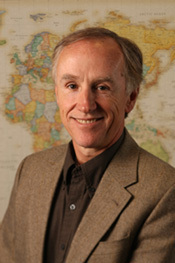
As diplomats meet in Asia to discuss new revelations surrounding North Korea’s uranium enrichment program, nuclear weapons policy expert David Cortright, director of policy studies for the University of Notre Dame’s Kroc Institute for International Peace Studies, says there is no need to panic.
“The new revelations are troubling but do not significantly alter the security calculus for the United States,” Cortright says. “The North’s program and the new enrichment program are violations of UN Security Council sanctions, but they do not pose an immediate danger of further nuclear weapons production.”
Suspicions about a North Korean nuclear enrichment program have now been confirmed by the new findings.
“A new light water nuclear reactor is in very early stages of construction, but it is primarily for civilian purposes and in any case is quite small,” Cortright says. “The nuclear enrichment program is also still small, although potentially more worrisome since it could be expanded and the low-enriched fuel could be enriched further to bomb grade levels. There is no need to panic or to increase military threats against the North. The redeployment of U.S. nuclear weapons to the Korean peninsula, as some officials have urged, would be dangerous and counterproductive. Military action could ignite a catastrophe in the region. North Korean officials have said repeatedly, and reiterated last week, that their nuclear program is in response to external military threats and will not be eliminated as long as those threats remain.”
Cortright says imposing additional sanctions will not work.
“The new revelations indicate that sanctions measures are not working, and that suspected supply routes to the North from Pakistan and Iran, facilitated by China, are enabling Pyongyang to continue its nuclear development,” he says. “The best solution remains diplomatic engagement. The U.S. and its allies need to go back to the formula that has produced occasional progress in the past: ending military threats, and offering to reduce economic sanctions and normalize diplomatic relations.”
A graduate of Notre Dame, Army veteran and long-time scholar, teacher and advocate of nonviolence, Cortright is an expert on nuclear weapons policy, prevention of conflict through economic sanctions and counter-terrorism. He is the author or editor of 16 books, including most recently “Towards Nuclear Zero”, co-authored with Räimo Vayrynen, a volume that argues for diplomatic bargaining to resolve the nuclear standoff with North Korea. Other recent books include “Uniting Against Terror: Cooperative Nonmilitary Responses to the Global Military Threat” and “Peace: A History of Movements & Ideas.”
Cortright has advised various agencies of the United Nations, the Carnegie Commission on Preventing Deadly Conflict, the International Peace Academy and the MacArthur Foundation. Along with his research collaborator and Kroc professor George A. Lopez, he has provided research and consulting services to the Foreign Ministry of Sweden, the Norwegian Institute of International Affairs and the Foreign Ministry of Germany.
Media advisory: Cortright’s comments may be used in whole or in part. He is available for interviews and can be reached at 574-631-8536 or dcortrig@nd.edu